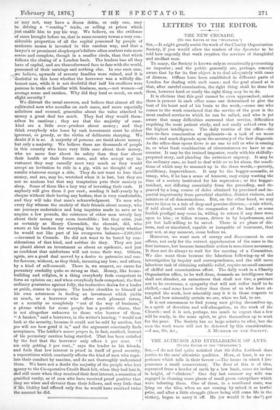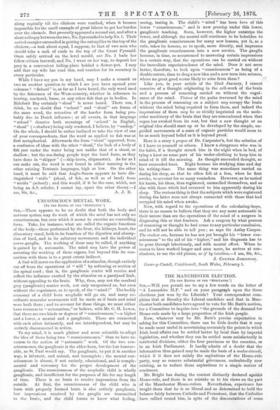THE ALTRUISM AND INTELLIGENCE OF ANTS. [To THE EDITOR OF
THB "SPECTATOR:'] Sin,—I do not feel quite satisfied that Sir John Lubbock does justice to the ants' altruistic qualities. Here, at least, is an ex- perience which tells in their favour :—The house in which I live possesses a small conservatory. The floor of this is of tiles, separated from a border of earth by a low bank, some six inches in height, of "clinkers." One day last summer my wife was engaged in cleaning some plants of small green caterpillars which were infesting them. One of these, in a moribund state, was lying on the tiles, when an ant coming by seized it as lawful prize, and after a little struggle (there being still some life in the victim), began to carry it off. He (or would it be she ?) got
along capitally till the clinkers were reached,' when it became impossible for the small example of great labour to get her burden over the obstacle. But presently appeared a second ant, and after a short colloquy between the two, No. 2 proceeded to help No. 1. Their united energies succeeded in getting the caterpillar to the top of the clinkers,—a task about equal, I suppose, to that of two men who should take a sack of coals to the top of the Great Pyramid. Once safely arrived on the level mould, ant No. 2 bade her fellow-citizen farewell, and No. 1 went on her way, to deposit her prey in a convenient biding-place behind a flower-pot. I may add that my wife has read this, and vouches for its accuracy in every particular.
While I have my pen in my hand, may I make a remark or two on another question to which I see you have opened your columns ? "School" is, as far as I have heard, the only word used by the fishermen of the West-country, whether in reference to herring, mackerel, basse, or any other fish that go in bodies. In Bideford Bay certainly " shoal " is never heard. There can, I think, be no doubt that "school" and "shoal" are forms of the same word, the retention of the harder form being pro- bably due to Dutch influence ; at all events, in that language " school " denotes both meanings of 'school' in English, "shoal" (=shallow) being only rendered, I believe, by "ondiep." On the whole, I should be rather inclined to take the view of one of your correspondents, that the word as applied to fish was at first metaphorical. Afterwards the form "shoal" appeared, from a confusion of ideas with the other "shoal," the look of a body of fish just under the water being not unlike that of a shoal, or shallow ; but the sea-faring people kept the hard form, as they have done in " skipper " (=skip-herra, shipmaster). As far as I can make out, the word is not found in either meaning in the other existing Teutonic languages, high or low. On the other hand, it must be said that Anglo-Saxon appears to have dis- tinguished "scalp" (shoal, of fish, as well as of land) from " sceolu " (school) ; and this would, if it be the case, which, not being an A.S. scholar, I cannot say, upset the other theory.—I



































 Previous page
Previous page